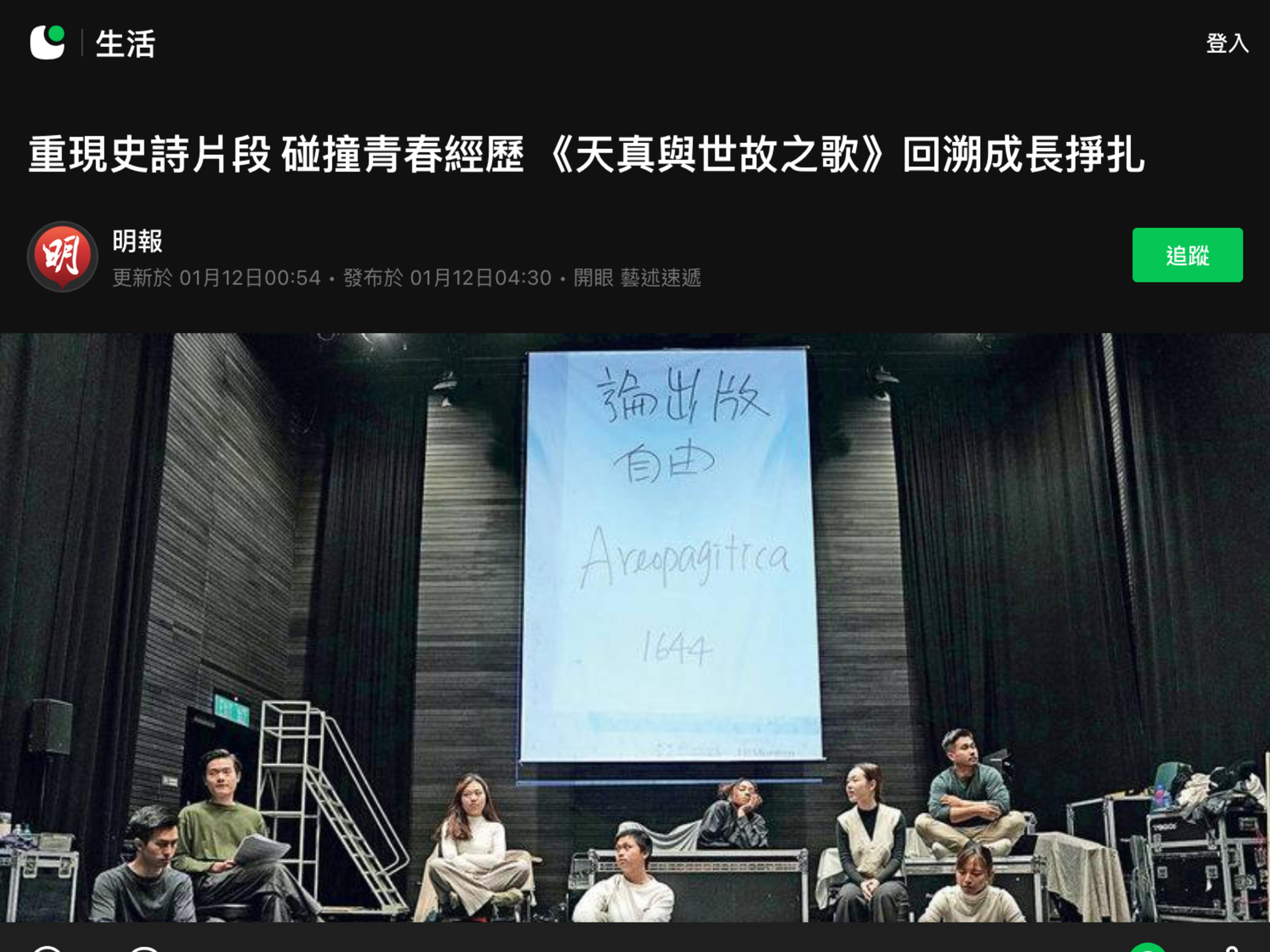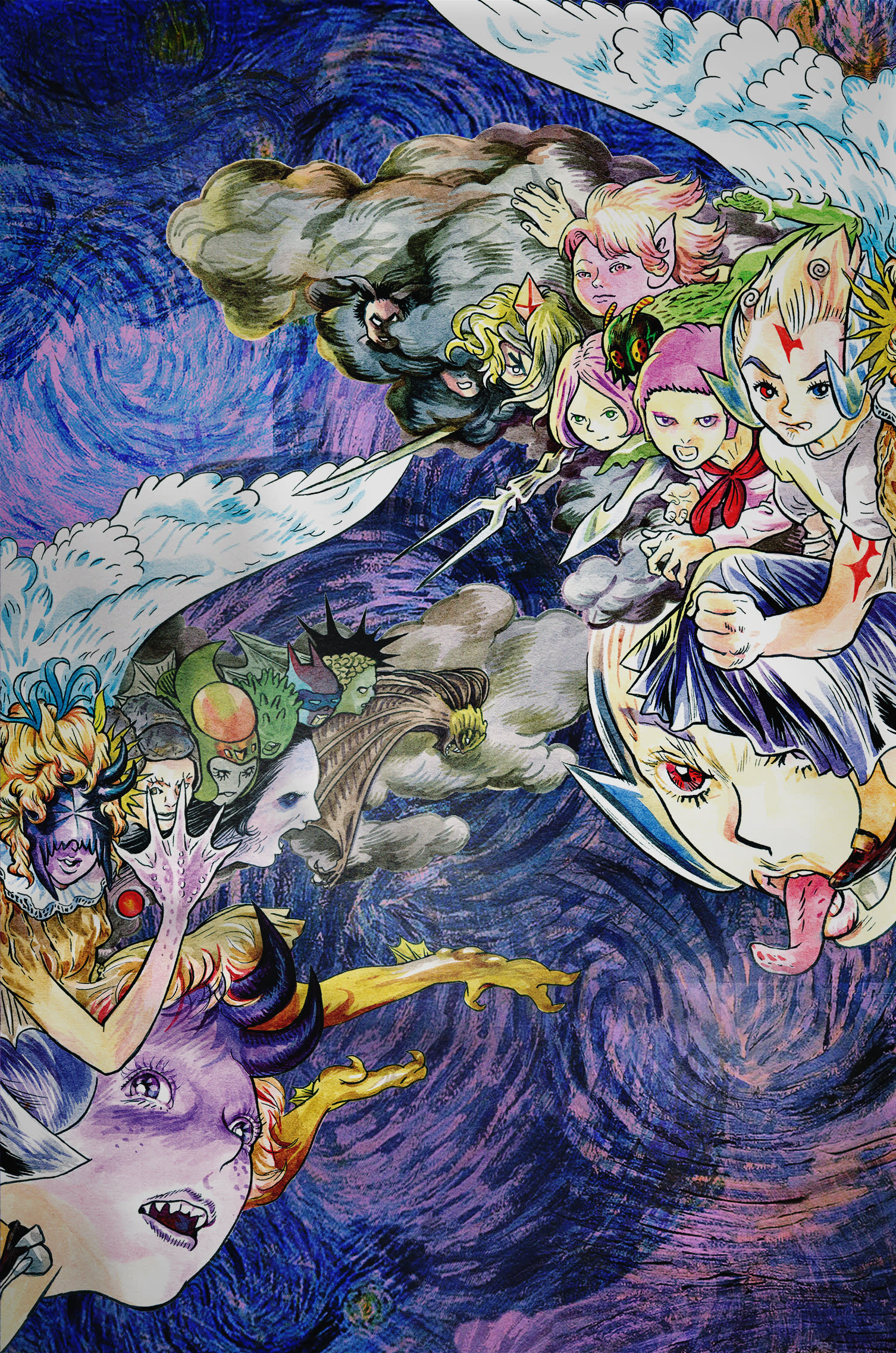
Revisiting Epic Moments: Songs of Innocence and Experience
The Collision of Youth Experiences, Reflecting on the Struggles of Growing Up
[Ming Pao News] Time goes back to the pandemic period, when a group of students from the Hong Kong Academy for Performing Arts, under the guidance of the theater company "Rooftop Productions," started from scratch to create a devised theater piece. They ultimately chose John Milton’s famous epic Paradise Lost as the narrative core, interweaving personal stories from the actors, and connecting themes of growing up with hymns, anime songs, and original compositions. The work is titled after William Blake’s poem Songs of Innocence and Experience, which responds to Paradise Lost. Although it was initially a school production, it received a nomination for the "IATC (HK) Critics' Award." Two years later, some of the actors have entered society and reflected on their experiences of navigating smoothness while maintaining their edges. The script has been revised based on their experiences, and the introspective creation will be performed as part of the West Kowloon Creators Series.
From Scratch to Reperformance Two Years Later
Co-producer and director Michelle Lee, along with director and musical director Ivor Houlker, selected the segment of Paradise Lost where Lucifer is cast into hell for rebelling against the omniscient and authoritarian God, transforming into the fallen angel Satan. They also referenced Milton's other work, Areopagitica, to discuss "What is growth?" Ivor believes that the themes of rebellion, resistance, power, or revenge in mythology are timeless, using the epic scale of storytelling to elevate the discussion of current societal issues. Michelle added that the audience will understand that epics are not just myths; the heroes within them have their weak sides. The state of rebellion, weakness, and confusion mirrors the experiences of young people about to enter society, caught between innocence and experience, the pursuit of freedom and respect for authority.
Imaginative Freedom: Decoding Paradise Lost
Two years ago, due to the pandemic, students at the Hong Kong Academy for Performing Arts could only participate in one production a year. Creative performer and lyricist Caroline Chan and creative performer Michael Mok participated in the creation of Songs of Innocence and Experience that year. They initially spent a long time in workshops that taught them what devised theater is, allowing students to create in different forms—they could write songs, prose, jokes, and freely imagine within the theater space. Caroline described the process as extremely valuable, with the two directors demanding high standards, constantly challenging them to think about the story of Paradise Lost, Blake's attitudes, and how to articulate their experiences, all of which were very demanding. Caroline said, "I grew up in a traditional Hong Kong school system that was spoon-fed, but here it really challenges you to think about why you think this way and the reasons behind it. We have to create new stories from everyone's thoughts and creativity." Michelle noted that she didn't want the audience to feel detached or to think the actors were just expressing themselves without meaning, so the most important part of the creative process was honesty, allowing them to confront heavy topics to evoke resonance. Michael recalled that at the time, they did not yet have a script; they were merely sharing the most important things in their lives, guiding each other, exploring common backgrounds and ideas. The entire process felt like decoding. "With a book as thick as Paradise Lost, there are many codes within it. In the decoding process, projections naturally occur, and we find common thoughts with Milton. When those thoughts arise, it’s part of the process of bringing out our own stories."
Script Changes with Experience: "Losers" Confronting Life
Michael plays Michael, one of the archangels and the strongest warrior by God's side. In Paradise Lost, Michael's segment deals with death, so Michael's personal story also addresses vulnerable topics in life, drawing from his own experiences to discuss how to face life and death. To bring up his greatest fear and enact it on stage is a vulnerable performance requiring great courage. Caroline plays Lucifer, the archangel favored by God, who later realizes that her options in Heaven are limited and wishes to break free from God’s control and constraints. The rebellious growth of Lucifer seems to resonate with everyone's experiences, and any actor could portray her, but Caroline's mixed-race identity gives her a stronger connection to Lucifer. "Because of my skin color, people see me as a foreigner or a black person, but I actually feel very connected to my identity as a Hong Konger. In this larger environment, there’s a sense of being an outsider." Having experienced unfair situations during her growth, she also imagines Lucifer simply asking, "Why?" After two years of growth and reflection, the script has changed significantly; dialogues, character relationships, and songs are all different. For example, Caroline no longer expresses her childhood story in poetry but reenacts her experience as a receptionist in a tanning salon, where she felt disrespected by her boss. Michelle joked, "Maybe life has really forced them; the actors have more thoughts and ideas, and their expressions of struggle feel more genuine, like confronting the deeper question of 'Do I still love myself?'" The goal of the actors and the team is not to showcase heroic anecdotes but to pursue honesty as "losers" confronting the stories of their lives.
Gallery
Originally published in: Ming Pao News. We create a mirrored version of reviews and articles about our shows for archival purposes, so that we can retain a version if the original disappears. We always link to the original publisher and credit the author. However, if you are the owner of this material and you would like us to remove it, please get in touch.
